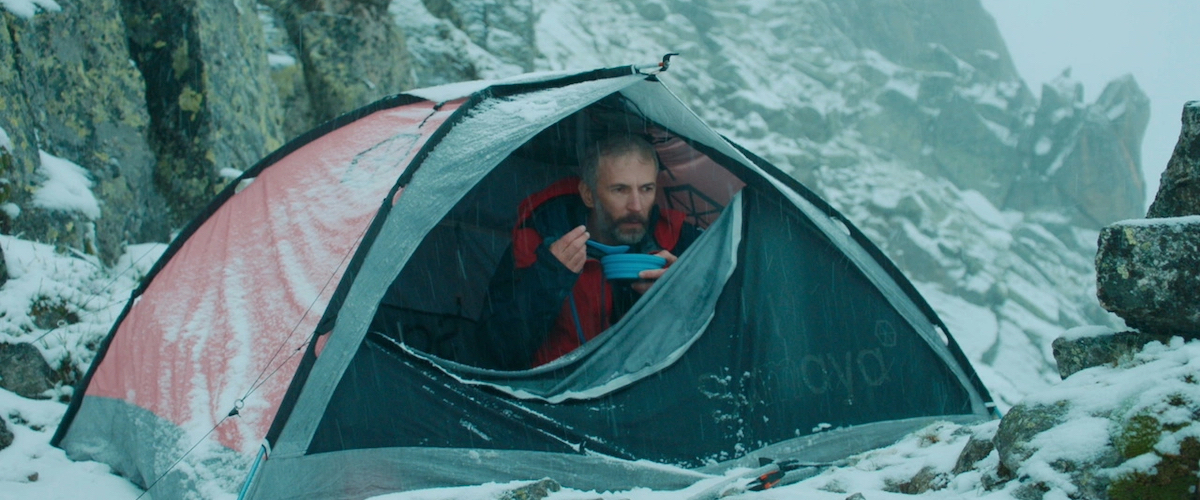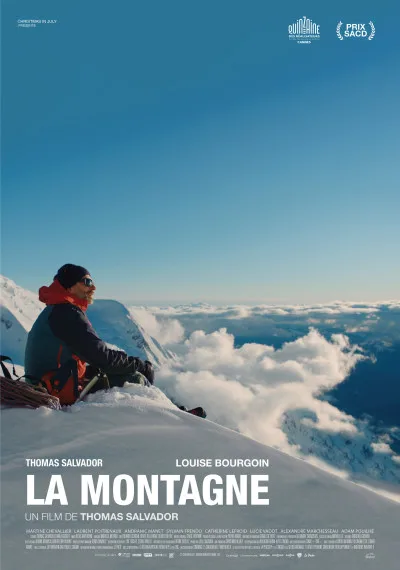When you’re in the purest and/or most extreme natural settings, one’s sense of time can get rejiggered. Or, as a character in T.S. Eliot’s The Waste Land put it, “In the mountains, there you feel free.” For is time not a constraint? Directed by and starring Thomas Salvador, “The Mountain” takes its time to loosen your sense of it, at least if you can submit to its rhythms. They’re slower and more considered than those of most contemporary films, and certainly more than most contemporary genre films, which “The Mountain” is, sort of. It’s a movie that, for potential viewers, is best served by minimal description.
“The Mountain” opens with Salvador, a handsome middle-aged fellow with salt-and-pepper hair and a light beard of the same coloring, appearing to be a nice, proper bourgeois French single man in the kitchen of his apartment. He drinks an espresso, rinses the mustard-colored ceramic cup he used, and places it upside down near the edge of his kitchen sink. Then, with a suitcase on wheels, he goes off into the street and onto a train, where he sits with work colleagues. In an industrial park in the Alps, the character, Pierre, demonstrates his company’s latest project, a robotic kitchen aid. Pierre looks out the conference room window and is struck by the sight of the mountain outside.
When his colleagues depart, he tells them he will stay on a bit. Inspired by an illustration of a mountaineering basecamp on the wall of the building he’s been staying in, he buys a tent. He goes skiing and sets up camp one night. Pierre is in shape and seems to know what he’s doing at least a bit. He invents an excuse to take more time off work, ascends Chamonix-Mont Blanc, and starts hanging out with the more intrepid mountain enthusiasts there, setting up camp in an area that more or less cautions against it.
Pierre is very calm and very sure of himself as he abandons the life he had closer to sea level. He sends a postcard to his mother announcing, without fuss, his intention to stay up top indefinitely. He’s so determined not to come down that he asks a favor of Léa, the head chef of a tony resort restaurant on the mountain, to mail the card for him on one of her trips down. Eventually, he gets her to do some grocery shopping for him, too.
Pierre’s mom and two brothers travel to visit, and one of the brothers, Marc, furious with Pierre and wondering how he’ll make do (“I have some money put by,” Pierre shrugs) really loses his merde with his sibling. No matter. Pierre doesn’t articulate any kind of philosophical or ecological rationale for what he’s doing. (In one scene, though, it’s said of a mountaintop glacier, “Where you see the ice now, it’ll be gone in two years.”) Not even a Bartelby-esque “I would prefer not to.”
So where does all this lead? Definitely not where you’d expect. The set-up suggests an eventual “Into the Wild” kind of catastrophe, but without giving too much away, the payoff is a bit more “Altered States,” albeit with an alien anthropological bent, so to speak. It all begins when Pierre sets off, solo, to investigate something that fell, or maybe crashed, into a glacier crevasse. The very nearly tactile imagery provided by cinematographer Alexis Kavyrchine and the sparse but evocative electronic score by Chloé Thévenin gives the journey an even more enigmatic form than it might have had otherwise. Salvador’s movie wants to penetrate something elemental in the viewer; if you can give in to its vision in good faith, it might just do that for you.
Now playing in select theaters.




















